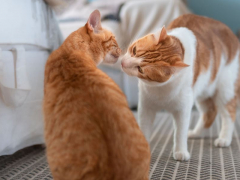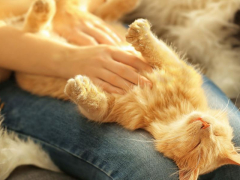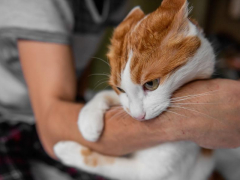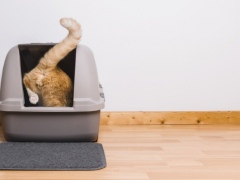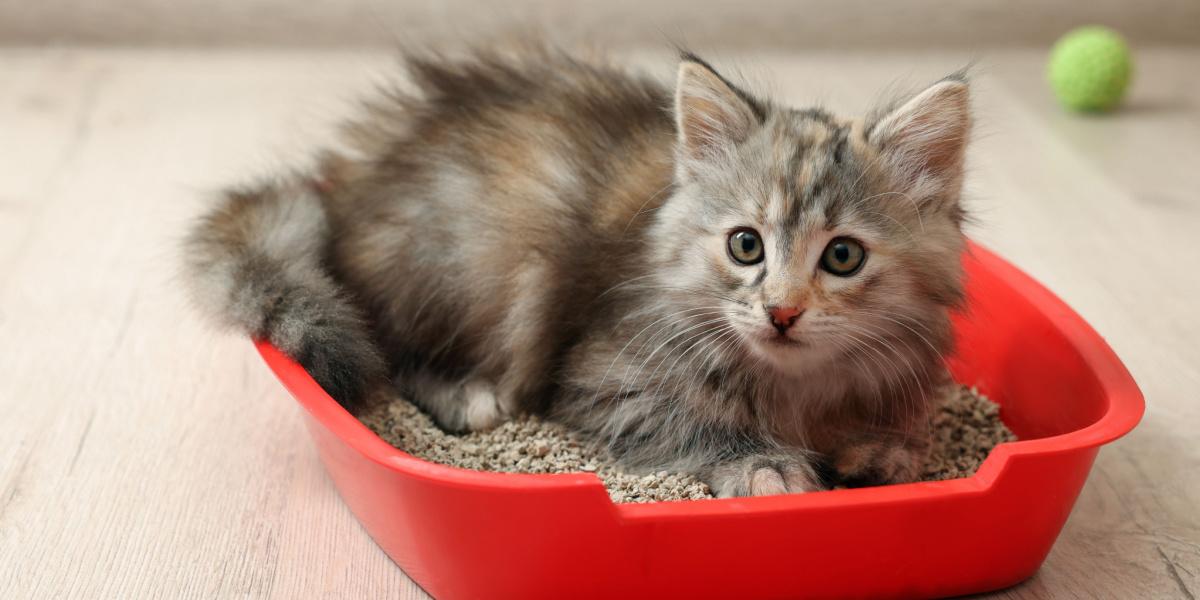
Have you ever wondered about the rituals our cats adopt when they visit the bathroom at home? If you are a cat owner, you will more than likely be familiar with the sound of your cat scratching and digging in their cat litter box.
It might seem like a strange (and messy) thing to do but there are actually many good reasons cats do this. Some of the reasons are completely normal and a part of their routine based on their instincts. Some of the reasons can mean that there is something stressing or upsetting your cat or that they have a health problem.
8 Reasons For Cat Excessive Digging in Litter Box
It’s very important to find out why your cat is digging in their litter tray and if there is anything you need to do about it. This article delves into the possible explanations and what you can do as an owner to help your beloved cat.
1. Natural Instincts
Some of the reasons cats dig are completely normal and are just your cat exhibiting usual feline behavior driven by their instincts.
Some cats dig to cover up their feces. They dig a small amount before they go to the bathroom to make a space to deposit into, then they dig afterward to cover up whatever they have done.
Historically, this was to keep themselves clean and also to cover their scent so that predators and competitors for their prey won’t be able to track them. It is not so important in domesticated animals but the instinct is still present.
2. Communication
Cats in a multicat household often use scratching and digging in the litter tray as a way of letting the other cats know that they are using or have used the litter tray. When cats scratch, this causes special chemical messengers called pheromones to be released from scent glands located in their paws.
Depositing these pheromones is another way of communicating with other cats. It sends out a signal that the litter box is occupied and it is a way of marking their territory.
This is normal natural behavior. However, it is important to bear in mind that if cats are claiming the litter box as their own and other cats need to use it, you might need to lay out a few extra trays in different locations so as to avoid competition and confrontation. Litter-box politics can cause big issues for multi-cat households.
3. Play
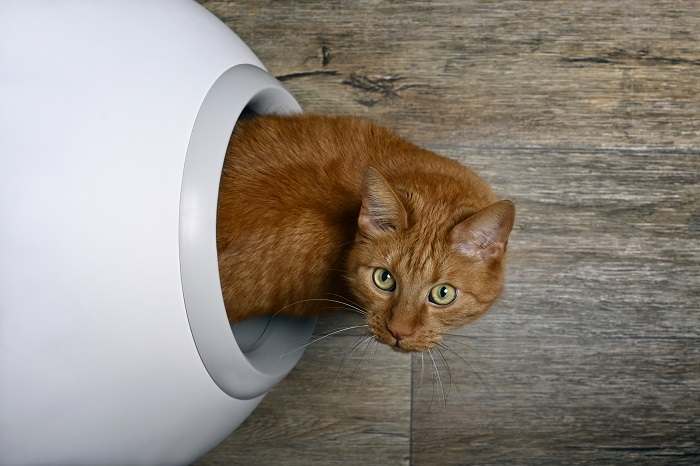
Some cats develop a habit of playing in the litter box as kittens and continue the behavior into adulthood.
Some cats genuinely enjoy playing with their kitty litter. They see it as a sort of enrichment in their environment. Some cats view the litter tray as their “happy place.” It is sometimes a habit they have picked up from an early age as a tiny kitten—they just enjoy it and it is something they do out of habit as adult cats.
Another reason can be that they are digging and rolling around to spread their scent in the litter tray and to attempt to increase the area that they see as their territory by flicking litter about.
This is not so fun to clean up and it’s obviously not the most hygienic place for them to play, so you can try and tempt them away with a toy or remove them and give them some attention if you don’t want them playing in there.
4. Stress
Cats are very complicated animals and they are sensitive to even the smallest of changes to their environment. If they suddenly start excessive scratching or digging in their litter tray, this could be a sign of stress.
If your cat feels stressed or threatened by another new family member (feline or human) they might start trying to bury their food and/or feces as part of an innate survival instinct kicking in. In the wild, this is to avoid being stalked by predators. In a domesticated cat, this might manifest as excessive digging in their litter tray.
Sometimes it can be another cat using the litter tray as mentioned above. If this is the case or if one of your cats starts going to the toilet in other places in the house, you might benefit from some more litter trays spread out in different rooms.
5. Litter Box Logistics
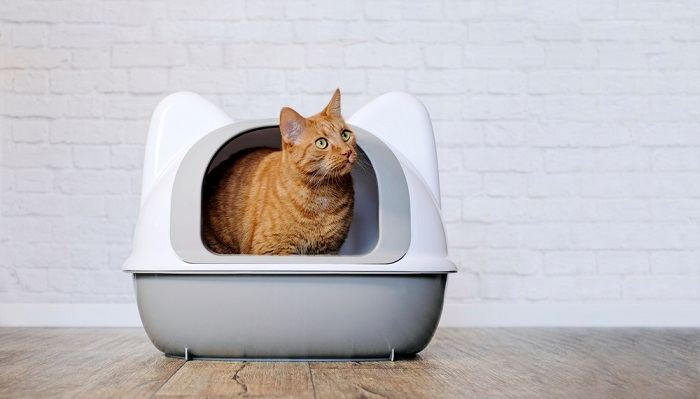
Anytime your cat’s litter box habits change, including an increase in digging or scratching, it’s best to visit the veterinarian for a checkup.
The size and shape of the litter box may not be suitable for your cat. Some cats like a really deep bed of litter and if it isn’t sufficiently covering the tray they can start digging to attempt to bury their feces.
Equally excessive litter in the box can cause them to dig and scratch to make a hole to go to the bathroom in. If the litter box is too small, your cat might feel like they haven’t got enough room and dig around to try and make space. You might need to buy a special size litter box if you have a large cat. It’s always best to assess and ensure they can move around properly in the box with ease.
Another thing that can upset your cat is if the litter box hasn’t been emptied and they need to go again, if they come to a dirty litter box they might start digging to bury what is already there before they feel comfortable using the tray.
Cats can also get stressed if they have an uncovered litter box or the litter box isn’t in a calm and quiet location where they feel they can have some privacy. A covered litter box is often a good solution for this or moving your litter box to a more secluded and private location.
6. Gastrointestinal Issues
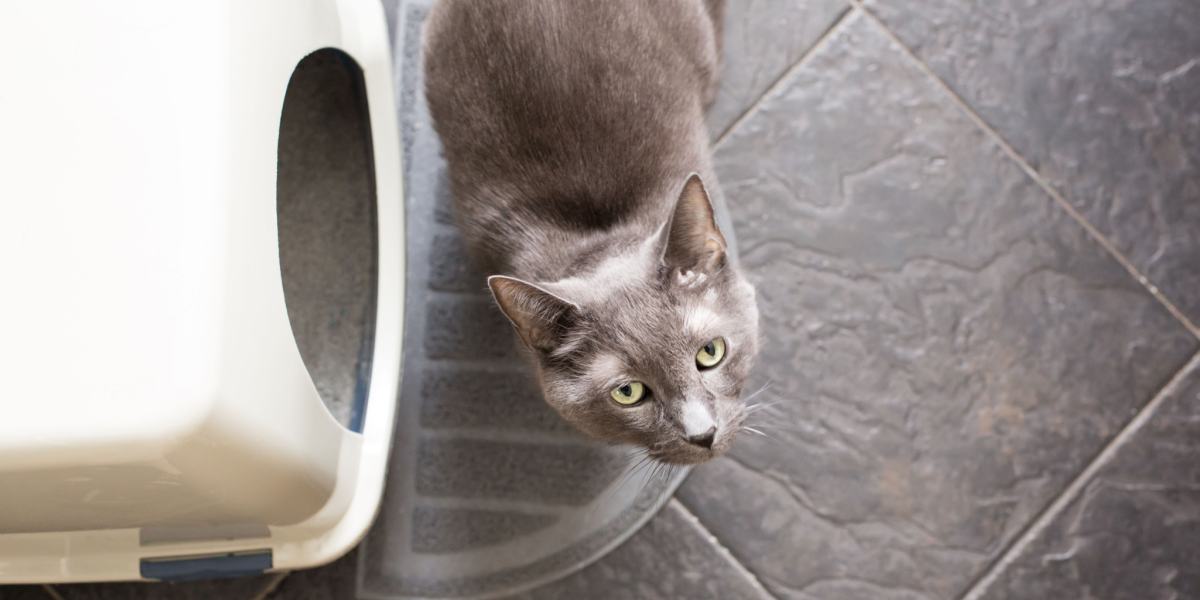
Cats with an upset stomach might visit the litter box frequently and dig more than usual.
If you notice your cat using the litter tray more frequently and digging in there, this could be an indication of gut problems. You might notice something obvious, such as diarrhea or blood present in their poop. It could however be something more subtle like them just visiting the tray more or less frequently than usual.
Many gut-related reasons could lead cats to digging in their litter tray. If their feces is too loose or too hard they might dig excessively to try and cover it. If their poop has a different smell, if there is blood present or if they have a parasite infection.
These can all cause great discomfort and distress to your cat and result in them frantically flinging their litter about. If you are at all unsure or have a concern, don’t hesitate to contact your veterinarian for advice.
7. Urinary Issues
A common problem cats encounter is urinary tract disease. If they are digging in their tray it might be the sign of an infection or inflammation of the urinary tract, causing them to have cystitis. If they are visiting the tray to pass urine very frequently, or if they are passing unusually large amounts of urine, this is also an indicator of disease, such as kidney failure.
There are other health issues that can cause changes in urination habits. If you have any concerns at all about your cat’s health, book an appointment with your veterinarian immediately to get them checked out and put your mind at rest.
A very important point to note: If your male cat is straining and digging frantically in their tray, and it doesn’t seem like he is able to pass urine, this could mean he has a blockage of his bladder. In this case, you need to go straight to your veterinarian or an emergency veterinary hospital to be checked out as this is a medical emergency. It is always better to be safe than sorry.
8. Paw Patrol
Your cat’s paws can sometimes become rough and dry, if your cat is an outdoor cat they can get callouses on them. Some cats enjoy the sensation of rubbing their paws in the litter to scratch their dry pads. They might also be scratching if clumps of litter get in between their toes, to attempt to dislodge them. It’s always a good idea to patrol those paws and check them regularly.
Also Read: The 5 Best Cat Scratch Deterrents
Final Thoughts
Our cat’s behavior can be confusing at the best of times. They have many reasons they might start excessive digging in their litter tray. The most important thing to do is to establish why they are digging. Once you have got to the bottom of that, then you can decide if it is an actual problem for your cat or normal instinctive behavior.
If it occurs as a sudden change of behavior, it is a good idea to take a trip to your veterinarian for a checkup to rule out any medical issues. It might just be an adorable quirk your cat has, in which case you can let them dig to their heart’s content.
Also Read: Why Is My Cat So Annoying? Cat Attention-Seeking Behavior Explained
